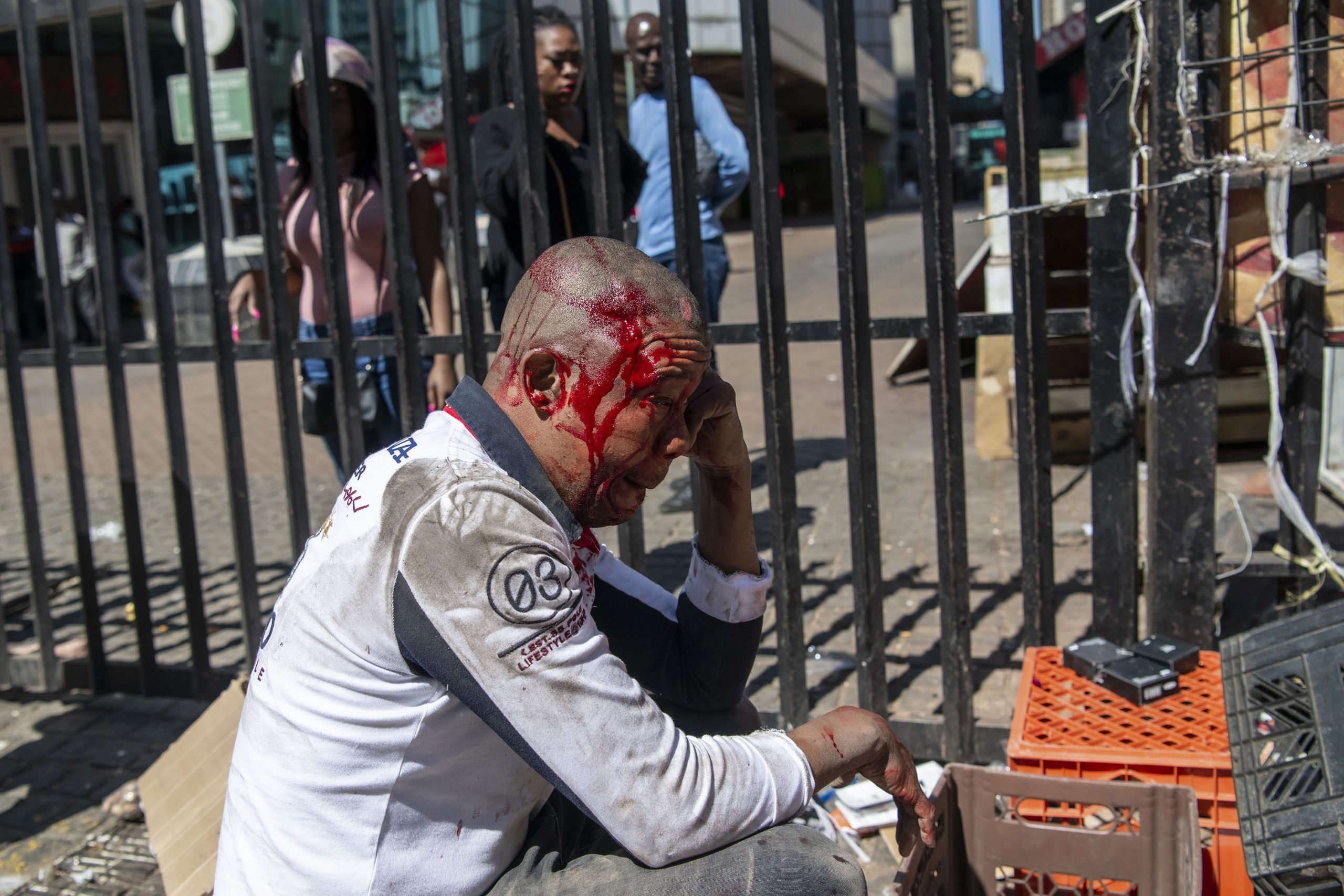Xenophobic ‘shutdowns’ turn indiscriminately violent
The ‘shutdowns’ spreading across Gauteng are intended as targeted xenophobia. But the actions of one mob in Joburg’s inner city show that, in practice, they can harm anyone in their path.
Author:
3 September 2019

Chaos reigned on Monday 2 September when a crowd that formed in Jeppestown on the eastern edge of Johannesburg’s inner city meted out apparently random violence as it moved through the city centre.
The mob was part of a series of province-wide “shutdowns” in Gauteng, information about which was disseminated through coordinated messages on social media in the preceding days. One such message accused migrants of spreading drugs, stealing property and taking jobs that ought to be given to South Africans, saying, “This is not xenophobia but the truth.”
The shutdowns come as the sharp end of a wedge that has been built over months of xenophobic statements by public officials in all major parties and spheres of government.

Blind violence
The shutdowns have been organised under explicitly anti-migrant slogans, and many among the Jeppestown crowd were fuming with similar sentiments. One man, holding a brick above his head amid a spree of looting in the inner city’s Ethiopian quarter, said he was “going to Hillbrow to fight with a Nigerian”.
But the wreckage left by the crowd suggested that, in practice, the shutdowns have been indiscriminately violent.
One of the victims left blinking in the wake of the crowd’s thuggery was Gift Ngema, a Soweto native and South African citizen. The crowd used an unidentified weapon to tear a deep gash in the head of one of Ngema’s neighbouring street traders – also a South African – as it moved along Rahima Moosa Street in Joburg’s fashion district.
Police officers in two vehicles looked on without acting as the crowd assaulted street traders and ripped through their businesses and those of some shop owners, owned by South Africans and migrants alike.

Ngema struggled to string a sentence together. Holding his head in his hands, he fumbled to help his neighbour, whose right eye was swelling ominously underneath his gaping head gash. Tubes of lipstick and eyeliner scattered across the sidewalk being picked up by giggling schoolgirls were the only hint that, a few minutes earlier, both traders had run moderately successful sidewalk cosmetics businesses.
Ngema estimated that replacing his destroyed and looted stock and equipment would cost him in the region of R50 000. But it was not the startling financial ruin that occupied Ngema’s mind as he surveyed the debris, clearly in shock. It was having failed to follow his own instincts. He had seen the messages circulating on WhatsApp. He had an inkling that going to work that day would be dangerous. He should have known better, he said.
Related article:
Of the 316 people killed during xenophobic violence in the past 13 years, 250 have been killed in Gauteng. These figures, recorded by Xenowatch at the University of the Witwatersrand’s African Centre for Migration and Society, bear out the often-blind nature of violence carried out in the name of anti-immigrant hatred.
More than a third of the 62 people killed during xenophobic violence in 2008, for instance, were South Africans. They were either targeted for coming from other parts of the country, mistaken for African migrants or, according to Jean Pierre Misago, a senior researcher at the centre, for “trying to defend themselves or protect their businesses”.
Under-reporting means that these figures are likely only part of the picture.

Xenophobic idioms
When a larger contingent of police officers eventually arrived in the fashion district, they took what appeared to be aimless routes through the inner city, stopping to wave their handguns at dispersed looters or beat them with wooden sticks and fire rubber bullets at them. The police made a handful of arrests. According to a National Joint Operational and Intelligence Structure statement, more than 110 arrests were made across the province during the shutdowns.
The crowd’s progress eventually came to a head when hundreds of people chanting “Zulu!” squared off against a collective of migrants who had managed to muster the numbers to stage something of a fightback at the Noord taxi rank.
There was virtually no police presence at the standoff. Police Minister Bheki Cele will be meeting izinduna today from some of Joburg’s hostels – allegedly the driving force behind the violent crowds – in an effort at “understanding the plight” of the crowds who have brought parts of the province to a brutal standstill. While Cele condemned the violence, he dismissed it as “nothing but criminality”.

According to some of those who made up the South African bank of the taxi rank standoff, migrants were responsible for a raft of the failures of democratic South Africa, from the transformation of unequal cities to entrenched joblessness.
One woman, who asked to remain unnamed as she rested towards the back of the crowd, asked how she could “live in a shack for 14 years, but a Nigerian owns that building”, pointing to a shop window.
Another man who chose to remain anonymous joined the crowd because they were “cleaning the country”. He had been motivated by joblessness to join the violence. “You can’t feel like a visitor in your own country,” he said. “I am a visitor, I don’t work.” He said the shop looting that accompanied the shutdown offered him an opportunity to gather groceries he is otherwise unable to afford.
The shutdowns, which consumed the province in escalating violence overnight, are poised to continue.




